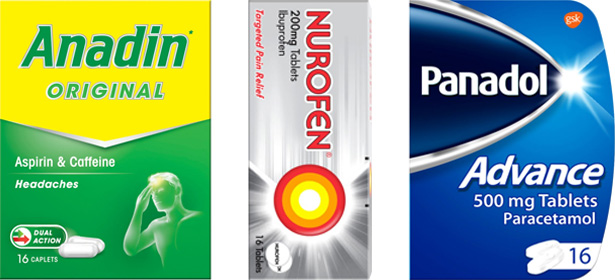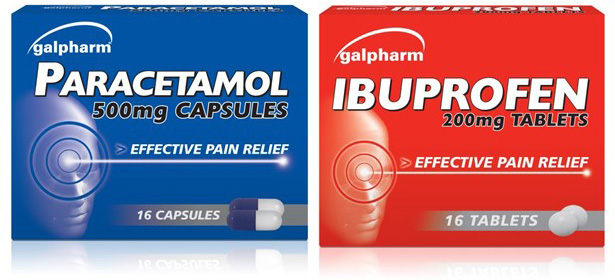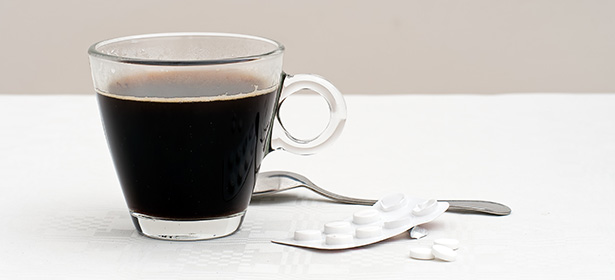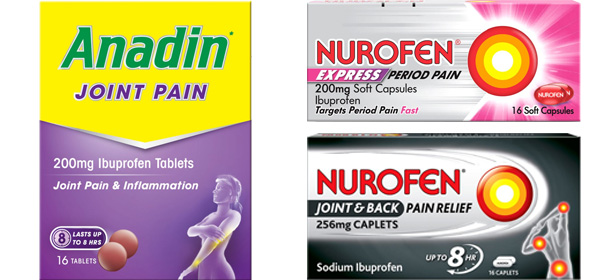Best painkillers: aspirin, ibuprofen or paracetamol?

In this article
- What is the difference between aspirin, ibuprofen and paracetamol?
- Aspirin, paracetamol or ibuprofen: which works best?
- Generic v branded painkillers
- Should I pay more for fast-acting painkillers?
- Do painkillers with caffeine work better?
- Do targeted painkillers work?
- Combination cold and flu remedies
- What if painkillers don't work?
With a wide range of over the counter painkillers available, how do you choose the best option for you, and is it ever worth paying out for pricier formulations and branded products?
We've found that, in many cases, the claims on packaging could be leading you to spend more on pricey products that are no better at relieving pain than cheaper, basic painkillers.
In this article, we explain how different types of painkillers work and which works best for different types of pain.
We also reveal which combinations work most effectively, according to medical research, and the pain relief products you don’t need, plus how to save money on painkillers.
What is the difference between aspirin, ibuprofen and paracetamol?

The three main over the counter painkillers on the market are different drugs. Their chemical compositions, strengths, and side effects vary from each other.
Paracetamol
Commonly used to treat headaches and most non-nerve pains. Paracetamol is unlikely to have serious side effects when taking the recommended dose, but taking too much can be very dangerous.
Make sure you’re not doubling up on your paracetamol dose if you’re taking a paracetamol painkiller with something else like a cold and flu remedy.
Ibuprofen
A non-steroidal anti-inflammatory drug (NSAID), thought to work better for pain associated with inflammation, like injuries or joint pain.
Ibuprofen should always be taken with food. If taken for long periods of time, NSAIDs can cause side effects like stomach upset or bleeding, and kidney and heart problems.
Pregnant women should generally take paracetamol instead of ibuprofen.
Aspirin
Another kind of NSAID but the NHS says it is less effective than ibuprofen, and it is thought to be more likely to cause gastrointestinal side effects. It’s best to take it with food. Aspirin should not be given to children under 16.
Ibuprofen and COVID-19
The Commission of Human Medicines expert working group has concluded there is insufficient evidence linking the use of ibuprofen with susceptibility to COVID-19 or worsening of associated symptoms.
The NHS says that you can take ibuprofen or paracetamol to treat the symptoms of coronavirus, but recommends trying paracetamol first as it has fewer side effects and suits more people.
Aspirin, paracetamol or ibuprofen: which works best?
A combination of ibuprofen and paracetamol was found to be the most effective for acute pain, according to a Cochrane review of evidence.
It also found that low doses of painkillers (for example 200-400mg of ibuprofen) in fast-acting formulations were among the best for acute pain, and that ibuprofen with caffeine worked well (though this could be a tablet and a coffee rather than a specially formulated tablet).
Aspirin was found to be the least effective. The studies looked at acute postoperative pain in adults, and don't apply to chronic pain.
It's worth noting that variability in people's response to painkillers is large, and so it can be difficult to draw accurate comparisons.
Generic v branded painkillers

When you’re feeling under the weather it’s tempting to just reach for the first remedy that has a recognisable brand name – but you'll probably be paying extra for the convenience.
Pharmacies and chemists are full of big-brand products, but a generic ibuprofen or paracetamol packet (like the Galpharm ones, above) costs roughly 30p and contains exactly the same active ingredients as many of the more expensive branded products – and is just as effective for common pain symptoms.
You’ll find the best-value generic medicines at supermarkets and discount stores rather than at the pharmacy.
The cheapest branded painkillers we found – £2 for a 16-pack of Nurofen and £1.40 for a pack of Panadol, both at Asda – were nearly five times as pricey as Galpharm generic 16-pack paracetamol (30p a pack) or Asda ibuprofen (35p a pack).
Soluble or easy-swallow formulations
One thing you may need to pay out more for is easier-to-swallow formulations, such as soluble or oro-dispersible (melt-in-mouth) tablets, or smoother caplets.
If you struggle to swallow pills, some can be crushed, or swallowed with substances like thick yoghurt, which can make them go down easier. Check with your pharmacist first to see what they recommend.
Should I pay more for fast-acting painkillers?

To use these sorts of claims, products labelled with terms such as ‘Fast acting’, ‘Rapid’, ‘Express’, ‘Advance’, must start to be effective within 30 minutes, and are specifically formulated to be absorbed more quickly in the body.
A Cochrane review (see above) found that fast-acting painkillers may be more effective, although they are generally much pricier than the regular type.
They may be beneficial if you are experiencing acute pain, but if you don't need fast relief you can opt for a cheaper product.
Do painkillers with caffeine work better?

Caffeine enhances how well painkillers work, and a dose of 100mg or higher can boost the effectiveness of a lower dose of ibuprofen.
But there are cheaper alternatives - a coffee or tea taken at the same take as painkillers can give you roughly the same caffeine hit.
- Espresso contains 48-317mg caffeine
- Instant coffee (one teaspoonful) contains 48-88mg
- Tea contains 75mg per mug
Do targeted painkillers work?

Many companies market medication described as targeting particular areas of the body.
When challenged, some brands have told us this helps customers know what they need to take for specific ailments. But, as these products are often priced differently, it can also mean paying over the odds for exactly the same thing.
It’s worth remembering that these sorts of medicines can’t target any part of the body in particular, so they aren't actually targeting your problem areas.
For example, Nurofen’s caplets for joint and back pain contain 256mg of sodium ibuprofen (a fast-acting version of ibuprofen). But while the Nurofen packs claim ‘targeted relief,' normal Nurofen Express tablets are exactly the same, and any generic rapid ibuprofen equivalent will have the same effect.
Anadin's Joint Pain and Nurofen's Period Pain capsules are the same as normal ibuprofen.
If you examine the fine print, you’ll find all these products carry the same marketing authorisation (product licence/PL) number.
This means they are the same, but the licence allows them to be sold under different names.
Combination cold and flu remedies

The cold and flu market is stacked with combination preparations that are advertised as a comprehensive remedy for a given ailment. But these usually cost more than their component ingredients – not all of which will even be needed for the duration of a cold.
Most standard cold and flu tablets contain:
- 25mg caffeine
- 300mg paracetamol
- 5mg phenylephrine hydrochloride
The combination is meant to combat drowsiness, pain and congestion (phenylephrine is used as a decongestant).
Combination remedies are usually more expensive than buying the individual medicines, as you pay for the convenience of only having to take one tablet rather than several.
Some of these combination products contain a lower than optimal amount of paracetamol, too. A standard paracetamol tablet contains 500mg, but combination tablets can have lower amounts. You also need to be careful about not taking paracetamol at the same time, to avoid taking too much by accident.
What if painkillers don't work?
If pain persists, don't just keep taking over the counter painkillers, as this could be dangerous. Prescription pain relief and stronger formulations are available, so speak to your doctor to discuss the type of pain you are experiencing and next steps for treatment.
